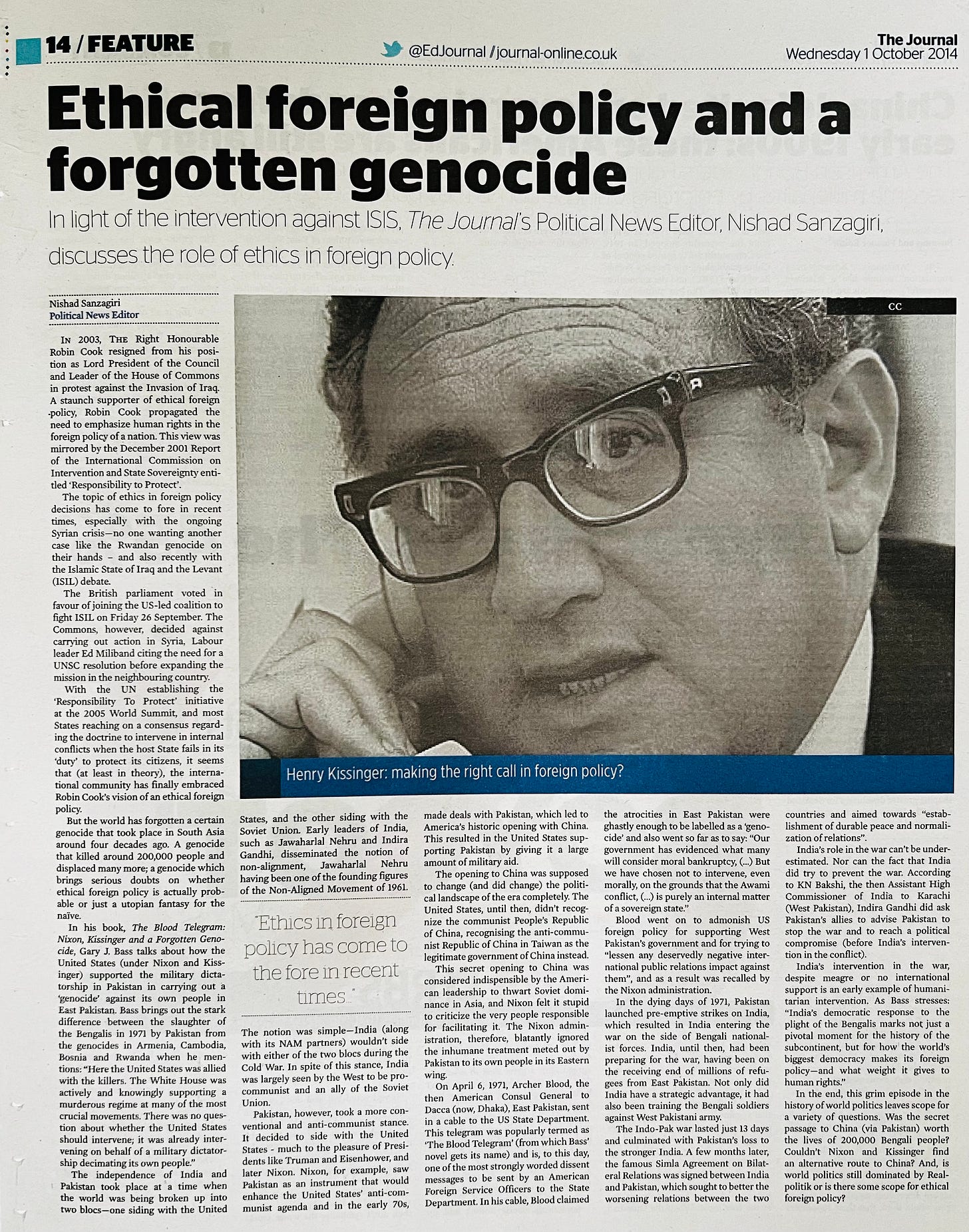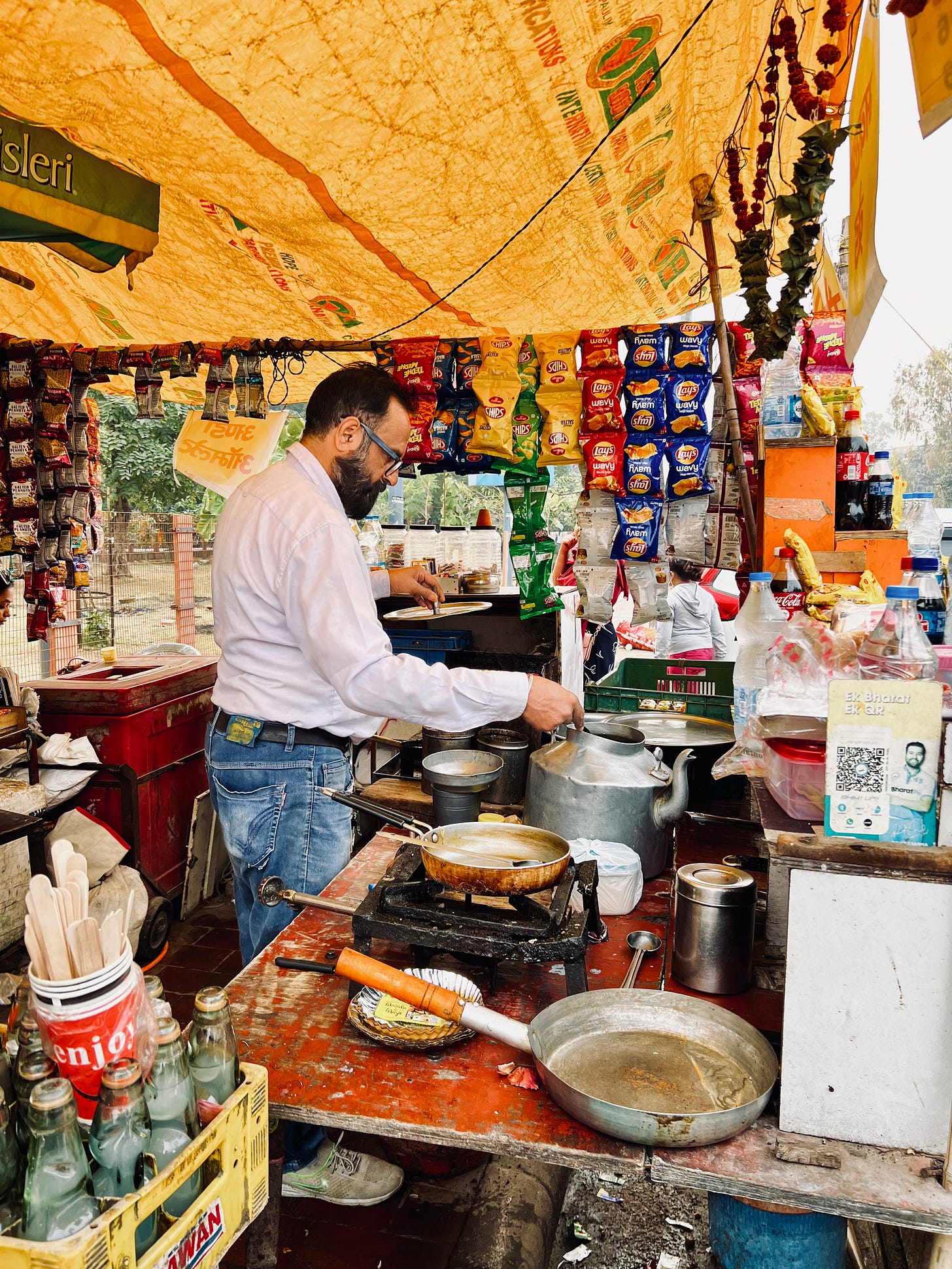Fresh from my two-week trip in North India, I’ve returned to London, just in time to be greeted by the season’s first snowfall. These travels have left me with a plethora of stories and insights, which I’m eager to share with you over the coming weeks, starting with today’s edition.
In this issue, I delve into:
The legacy of Henry Kissinger, a figure synonymous with American grand strategy
Professor Lea Ypi’s heartfelt perspective on the European migrant crisis
And, a reflection on the timeless value and joy of rekindling childhood friendships.
Handpicked Reads

Henry Kissinger’s passing last week at the age of 100 marks the end of an era for a figure who reshaped global geopolitics as the most powerful postwar US Secretary of State. As a scholar-turned-diplomat, Kissinger was instrumental in the US’ rapprochement with China and the resolution of the Vietnam War. And yet, while many will solely eulogize him, it’s imperative to acknowledge that his legacy is also marred by the ethical dilemma of realpolitik, particularly evident in the harrowing 1971 genocide in what was then East Pakistan. Prioritizing the strategic importance of Pakistan in the US’ rapprochement with China, Kissinger knowingly turned a blind eye to the atrocities, even providing military support to Pakistan’s dictatorship, which was carrying out this assault on its own citizens. This decision resulted in untold suffering and displacement in (what is now) Bangladesh, with the death toll ranging from 300,000 to 3 million Bengalis. His role in this tragedy, as highlighted in my article from nearly ten years ago, epitomizes the ongoing struggle between moral values and national interests in diplomacy. Given developments across the world today, the question I asked in my earlier writing still stands: “Is world politics still dominated by Realpolitik or is there some scope for ethical foreign policy?”
In an insightful article in the Financial Times on the European migrant crisis, Lea Ypi, professor of political theory at the London School of Economics, shares a personal narrative of her family’s flight across the Adriatic from war-torn Albania to Italy and how framing migration as a problem endangers society. In it, she mentions how since moving to Western Europe, she has struggled with her Albanian identity. Like Ypi, I too have found myself tempering my (Indian) cultural identity since moving to the UK, a subconscious effort to assimilate into Western norms for acceptance. This phenomenon is not unique to us; it’s a common path for many adapting to new cultural landscapes. Ypi’s article spotlights a broader socio-political concern, while also highlighting the complexities faced by immigrants — an experience of compromise, subtle adjustments, and the internal conflict of fitting into a new mould.
(Not-So) In-Depth Reflections

On rekindling childhood ties
Life has its ups and downs and periods of darkness, but now and then it springs a surprise, such as an encounter with an old friend, and makes us want to go on a little longer.
— Ruskin Bond, Gathering of Friends
There is something ineffably special about the friendships forged in childhood; a notion vividly encapsulated by the Indian term ‘chuddy buddies’. This phrase, whimsically reminiscent of days spent in carefree abandon and undergarments — for that’s the literal translation of chuddy — is a testament to the unbreakable bonds formed in the playgrounds of our youth.
My recent journey back to India for a high school friend’s wedding in Lucknow was more than just a celebration; it marked a poignant reunion after nearly a decade. This scenario is all too familiar for those of us who are third culture kids. We spent our formative years in schools far from our homelands, forming bonds in these multicultural environments. Then, as the years went on, some of us, like myself, emigrated to entirely new countries, while others returned home. Despite the physical distances that our circumstances imposed on us, our connection remained strong, sustained by shared memories and the rise of social media.
Although I was apprehensive at first of a reunion after such a long hiatus, we seamlessly picked up from where we had left off. Childhood friendships, as I was reminded, are built on a foundation quite unlike any other. In those days, our lives were strikingly similar — we were all innocent, exploring the world with wide-eyed wonder and making plans together like the world was our oyster, largely shielded from life’s harsher realities. Back then, between the long school hours and extra-curricular classes, our friendships were rooted in shared experiences and circumstances that remained constant for years, offering a simplicity and depth that’s harder to find as we grow older, with adulthood bringing factors like careers, relationships, and varied living situations into play.
I don’t mean to pit one type of friendship against another, for that won’t be fair to the deep relationships we have all forged in adulthood. But the point I’m trying to make here is that for those of us whose paths have led us across different countries and markedly different experiences, there’s a special allure in reconnecting with friends who knew us from another era. These friends offer a unique mirror to our past, reflecting a version of ourselves from a different time. This reflection has a temporal quality that’s both unmatched and invaluable, providing insights and perspectives that are distinct from the relationships we build later in life.
The reunion in Lucknow also brought into sharp focus the quarter-life crisis many of us were grappling with, an indication that despite our separate growth, we were all, more or less, navigating similar experiences. This contemporary convergence helped us understand the new adult versions of each other. Instead of merely stretching the memory of our childhood selves onto the grown-up bodies now before us, we embraced the reality of who we have become, warts and all.
From debating career shifts and relationship woes, to reflecting on spirituality and the existential search for purpose, ours was a journey of rediscovery and of acceptance; acknowledging the evolution of our identities while simultaneously cherishing the constancy of our shared beginnings.
Moreover, for me, one particularly striking aspect of the reunion was the unique space it provided for exploring masculinity in male friendships, something I’ve been paying attention to recently. Growing up, my male friends and I shared an openness and vulnerability that I have found harder to find in later life. We expressed emotions freely and were not afraid to be vulnerable. As we have grown older, the societal norms around masculinity have intensified — e.g., the understanding that we ought to be stoic and self-reliant in the face of adversity. These cultural norms have consciously and unconsciously influenced the ways we interact and express ourselves around other men; creating barriers to the emotional depth that came easy for us as children. I was pleasantly surprised that we still managed to peel back the layers and connect with aspects of our younger selves that society has taught us to restrain, reminding me of the profound emotional connections that male friendships can propagate when unshackled by the rigid constraints of conventional masculinity.
But most of all, this reunion reminded me of an important lesson: It’s never too late to reconnect. I admit, I haven’t been the best at keeping in touch, but this experience showed me how easy it is to rekindle old friendships. So, if there’s a friend you’ve been meaning to reach out to but haven’t, consider this a nudge to do so. You just might be surprised by what you find — a familiar comfort, rehashing of shared memories, and perhaps, new dimensions to an old bond.
Every edition of Infinity Inklings aims to spark your curiosity. Did it resonate with you? Your feedback is invaluable, so please do hit the reply button if you want to share your thoughts.
If it struck a chord, consider sharing with fellow inquisitive minds.



